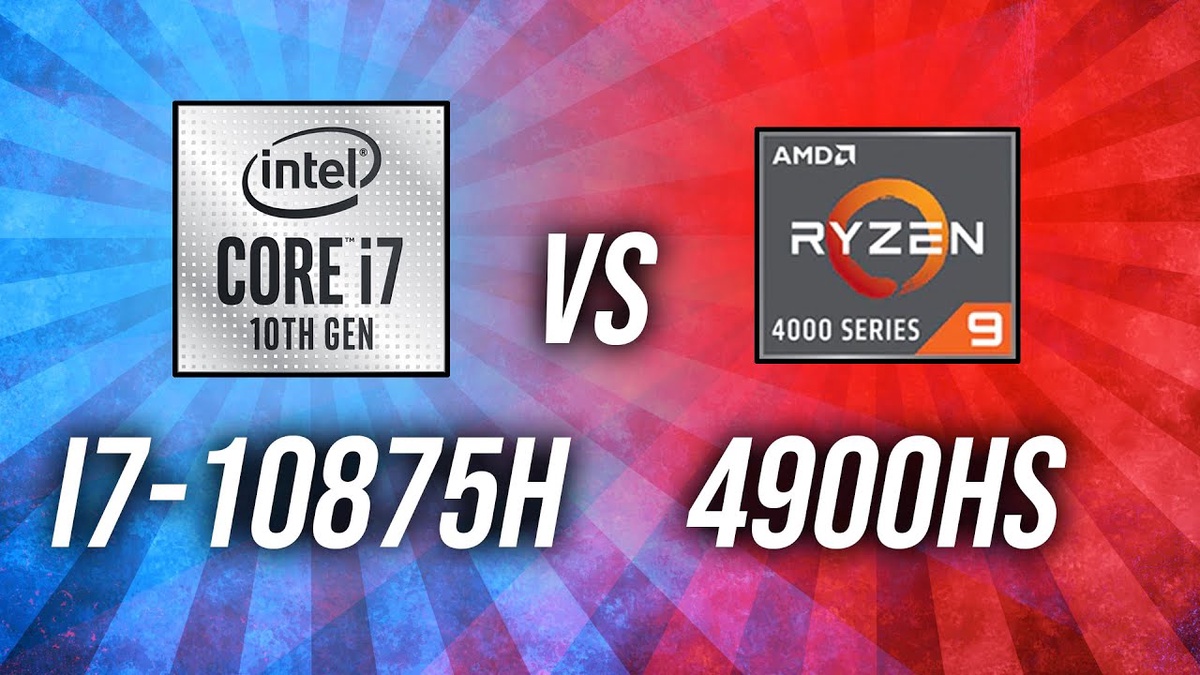Intel has just launched their new 10th gen processors, let’s find out how the 8 core i7-10875H compares against AMD’s new Ryzen 9 4900HS. These are the key spec differences between these processors.
Both are 8 core 16 thread parts, however the i7 has double the L3 cache, a higher power limit, and higher boost speeds, but the Ryzen chip is able to use faster memory and has a higher base clock. That 5.1GHz boost speed for instance is single core only, and is based on Intel’s Thermal Velocity Boost technology, so it will only happen while thermals remain low.
 The laptops I’m testing with are the ASUS G14, a smaller 14-inch gaming laptop which has the Ryzen 9 4900HS inside.
The laptops I’m testing with are the ASUS G14, a smaller 14-inch gaming laptop which has the Ryzen 9 4900HS inside.
The first i7-10875H laptop I’ve got my hands on is the Gigabyte Aero 17, it’s substantially larger and louder in terms of fan noise when compared to the G14.
Starting off with Cinebench R20, I’ve got the Ryzen 9 4900HS up the top of the graph, and three results with the 10875H with different power limits. The bottom result is with the i7 capped to 45 watts, which Intel consider stock speed. The next result is at 62W, which I’ve just included as this is the highest the Gigabyte control panel lets the user set on the aero 17. I’ve also boosted the power limit to 200w with Intel XTU and just let it run at the thermal throttle limit. In Cinebench this would actually run at 100W, but I’ve listed it as 94W as this was what it sits on in the heavier blender benchmark, so basically it’s maxed out and drawing way more power in this mode. Anyway the 4900HS was ahead in single core, and only slightly behind the maxed out i7 in multicore, That said, the 4900HS would score around 4300 in multicore for the first 2 runs, but I show the averages of 5 runs and the score drops there once the boost period expires.
I’ve also got some older Cinebench R15 results for those that still use it, interestingly this time the 4900HS was behind in single core, but this time it was ahead in multicore in all tests.
Handbrake was used to convert a 4K video file to 1080p, then a separate 1080p file to 720p. In this test, the 4900HS was the fastest, running 29% faster in the 4K test than the i7 at 45 watts, 16% faster when the i7 gets boosted to 62 watts, and 7% faster with the i7 consuming far more power.
Blender is another core heavy workload, the 4900HS was just slightly ahead in the BMW benchmark, but then behind the maxed out i7 in the classroom test. I suspect this is because the 4900HS can boost above its 35 watt limit for a few minutes and the BMW test is shorter than classroom. Once things settle in though, the i7 was faster with this much higher power limit.
V-Ray is another multicore test, the 4900HS at 35 watt TDP was scoring very closely to the i7 with higher 62 watt TDP, while the i7 was then out in front if we max out the power limit. The 4900HS was about 15% faster than the i7 if we stick to its stock 45 watt speed.
This benchmark also uses the CPU to render out a scene, however interestingly in this test the 4900HS was only beating the stock 45 watt i7, at higher power limits the i7 was completing this task faster.
7-Zip was used to test compression and decompression speeds. The 4900HS was around 17% faster than the i7 when it came to decompression speed, however the i7 was about 10% faster when it came to compression, and there was basically no real difference on the i7 regardless of power limit in this test. 
Veracrypt was used to test AES encryption and decryption speeds, and with this test the i7 was faster than the 4900HS regardless of the power limit in use. I’ve finally upgraded to Geekbench 5 from version 4, and in this test the i7 was faster in single core, however when it came to multicore the 4900HS was putting up a good fight. Its score was very close to what the i7 was producing with a much higher power limit.
I’ve finally upgraded to Geekbench 5 from version 4, and in this test the i7 was faster in single core, however when it came to multicore the 4900HS was putting up a good fight. Its score was very close to what the i7 was producing with a much higher power limit.
I’ve used Adobe Premiere to export one of my laptop review videos at 4K, however the preset that I test with benefits from quicksync, so the i7 processor is able to leverage the iGPU to greatly boost performance. As a result, the Ryzen processor is behind in this specific test. Quicksync is currently an advantage of the Intel platform, so this is fair and valid, but if you export with say 2 pass instead, then I’d expect the results to be much closer together.
I’ve used Adobe Premiere’s warp stabilizer effect which uses a single core to smooth out a clip, and in this test the 4900HS was around 14% faster than the i7. There’s minimal difference to single core performance when adjusting the power limits of the i7, as this typically isn’t a limitation in lighter workloads.
Adobe Photoshop was tested with the Puget systems Photoshop benchmark, and I’ve tested this with the discrete graphics disabled as both laptops have different solutions. In any case, the i7 was faster in this photoshop test. It does use large images, so may see a benefit from the higher cache from the Intel chip.
These are the average differences between the Ryzen 9 4900HS and the Intel i7-10875H with its stock 45 watt power limit in all of the tested workloads.
On average the Ryzen chip was almost 7% faster, however that overall percentage isn’t too useful as it includes both single and multicore tests. If you’re not interested in the Premiere result as it uses quicksync, well the 4900HS would be 10% faster without that.
Here’s how things change when we instead run the 10875H processor with the 62 watt power limit, the highest Gigabyte allows through their control panel software. On average the 4900HS was less than 1% faster, but again the i7 is seeing it’s best result in Premiere due to quicksync, without that larger outlier the 4900HS would be 3% faster on average.
With the Intel i7’s power limit boosted up so that thermal throttling becomes the limitation, it’s ahead of the 4900HS in more tests than not, however despite the huge power difference the 4900HS was still able to come out ahead in some workloads, namely Handbrake where it consistently offered a nice advantage over the i7.
Here’s where things get interesting, this is what the total system power draw from the wall looked like when running the blender benchmark. The 4900HS laptop was using less power in this test. Even the i7 at 45 watt limit was using about 47% more power, and then with the i7 effectively no longer power limited it’s drawing over 150% more power from the wall compared to the 4900HS. If you recall the 4900HS was actually performing better in this test, and that’s seriously impressive given how much less power is required, it really seems to show how efficient AMD’s new 7 nm processors are compared to Intel’s 14nm+++.
These are the average clock speeds during the same blender test, not really an apples to apples comparison here due to different architectures and IPC, but the 4900HS was still completing this blender test the fastest with slightly lower speeds than the i7 at the 62w limit. The i7 with the highest power limit was able to hit higher clock speeds, but as we just saw it needs significantly more power to do so.
More power typically means more heat to dissipate, and the results here are very interesting too. The i7 was a little cooler than the 4900HS with its lowest 45 watt limit, but keep in mind the Gigabyte Aero 17 is a larger 17-inch laptop with far louder fans, as I did testing of each at maximum fan speed for best performance. The 4900HS is still cooler than the i7 at 62w, and then when the i7 isn’t power limited the next limit is the 90 degree thermal throttle limit which is being hit here.
Unfortunately there are no gaming results at this time as the ASUS G14 uses 65 watt RTX 2060 Max-Q graphics and I don’t have any Intel laptops with the same GPU at this time, however I’ll do some gaming comparisons in future once I get my hands on comparable machines.
Likewise, hopefully I get the 4900H in future to compare with, it will be interesting to see how the extra 10 watts changes things. AMD finally has a competing mobile processor on their hands here. It’s using significantly less power than the Intel counterpart while also running cooler in many instances, all while being in a physically smaller laptop.
If we actually run the i7 at Intel’s stock 45 watt power limit, it’s getting beaten in most cases. To be fair though, most Intel processors in CPU only workloads do run closer to 60 watts, and with this limit the performance gap between them certainly closes in.
Using software like Intel XTU we can boost the power limit of the Intel processor even higher, at which point the limit will be thermals, so results will vary based on the thermal solution of the laptop. Although the i7 is performing better on average, when you consider it’s using 150% more power to do so and thermal throttling, I’m inclined to give the win to the 4900HS. Intel have been on the 14 nm architecture since 6th gen, there have been minor improvements but for the most part their solution has been to continually pump up the clock speeds, which requires more and more power to sustain.
Things may change with undervolting, which is typically a bonus with the Intel platform, however this was disabled on my Aero 17 and could not be done with either Intel XTU or Throttlestop.
I can’t find fair pricing at the moment, as I’m making this prior to 10th gen going for sale, but you’ll be able to find updated prices linked in the description. ASUS G14 is around $1450 USD with the specs I’ve tested here, and my Aero 17 is well over $2000 USD, granted it does also have the higher 2070 Super Max-Q graphics, with the 1660 Ti it’d be less and possibly more competitively priced.
Let me know what you thought of the performance differences between the i7-10875H and Ryzen 9 4900HS down in the comments, which would you get and why?


No comments yet